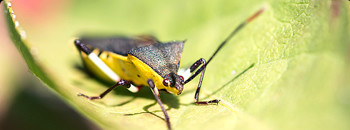Written by: Robin L. Tabuchi, Research Entomologist, University of California, Berkeley.
Summer is in full swing! I like to celebrate the season gathering with good friends, good food and of course, fireworks! Let’s celebrate the fourth of July with a bang; not a bunch of bites. When planning your backyard barbeque celebration, take some precautions to keep mosquitoes off the guest list.
Everyone has experienced mosquito bites. Some have mild reactions, but others get big, swollen, itchy welts lasting for several days. If the irritating bites weren’t enough, now we have to watch out for West Nile virus; the most prevalent mosquito-borne disease in the United States. Mosquitoes perpetuate the disease by feeding on infected birds, obtaining the virus, and then transferring the virus to humans or other animals when they feed again. Controlling mosquitoes is the best way to protect against West Nile virus.
Reduce the population. In just under one week, a mosquito can complete a whole life cycle. Mosquitoes lay their eggs on the surface of standing water. Larva hatch, feed on bacteria in the water, and pupate in a matter of days. Adults emerge and spend the rest of their life on land.
Since mosquitoes require water for development, eliminating standing water is the first step in controlling them. Mosquito larva can survive in many unlikely locations so check all areas of your yard for standing water. Some common breeding grounds include: open trash bins, tree holes, bird baths, clogged rain gutters, uncovered boats, potted plant saucers, pet water bowls, and neglected swimming pools. If you have a pond or other water feature in your yard, one way you can control the mosquito population is by using mosquitofish.
Personal protection and barriers. You have eliminated breeding sites in your yard, but what about your neighbor’s yard, or the creek behind your house, or the dumpster down the block? It’s impossible to eliminate all mosquitoes, so make sure you are prepared when you spend time outdoors. Wear long sleeves and pants especially during dawn and dusk when mosquitoes are most active. Following label directions, apply an effective insect repellent, such as DEET, to skin or clothing. Lastly, ensure your doors and windows have screens that are in good condition and doors are kept closed when not in use.
Ask for help. Upon request, many Mosquito and Vector Control districts will inspect your property and provide advice for controlling mosquito populations. Some districts will also provide free mosquitofish. Lastly, if you are concerned about West Nile virus, check out the Center for Disease Control for more information.

